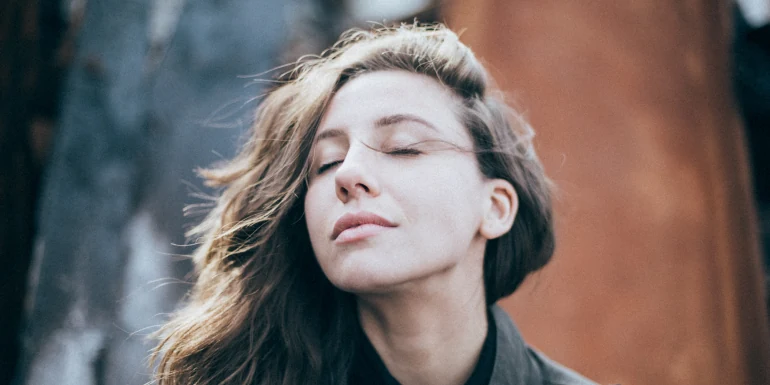
Headache or migraine?
Do you often suffer from headaches? Are their symptoms more like migraines? Can you get migraines without headaches? Get to know the differences between headaches and migraines so you can treat them more effectively.
Your head throbs and pounds. Headaches are very common, with around a third of all women and a quarter of all men in Switzerland suffering from headaches at least once a month. There are roughly 200 different types.
The most frequent types are:
- Tension headaches
- Migraines with aura (e.g. impaired vision)
- Migraines without aura (much more common than migraines with aura)
- Cluster headaches
These types of headache account for around 90% of all headaches. They are among the types known as “primary” headaches, which means they have their own separate pathology. Specialists talk about secondary headaches when they occur as concomitant symptoms of another illness, such as high blood pressure, the flu. And also medication or stimulants like alcohol, nicotine and caffeine.
Migraines vs. headaches
Not every headache needs the same treatment. That’s why it’s important to know the difference between migraines and headaches or cluster headaches. The following characteristics can help with this:
1. Pain area
Where do tension headaches occur?
- Usually on both sides of the head
- At the temples, forehead, the back of the head or anywhere on the skull generally
Where do you feel the headache with a migraine?
- Usually on one side
- Often behind the forehead, temples or eyes
- Pain can change location throughout the course of the migraine
Where do you feel cluster headaches?
- On one side around the eyes or temples
2. Symptoms
How do tension headaches feel?
- Pressing, squeezing, dull
- Mild to moderate pain
- Diminish with movement, e.g. walking
- Without accompanying symptoms like nausea or vomiting
What are migraine headaches?
- Throbbing, pulsating or pounding
- Moderate to severe pain
- Accompanying symptoms: nausea, vomiting, loss of appetite, sensitivity to noise, light, smells
- Occasionally a migraine aura just before the onset: visual impairments like flickering vision, light flashes, speech or sensory impairments (like tingling) and, rarely, dizziness
- Physical activity makes migraine symptoms worse
What do cluster headaches feel like?
- Piercing, stabbing
- Extremely severe pain attacks
- Accompanying symptoms: watering eyes, runny nose, sweating on the forehead or face
- Physical activity helps; increased urge to move during the headache
3. Duration of pain (without treatment)
How long do tension headaches last?
- 30 minutes to 7 days
- Sporadic or chronic in frequency (i.e. at least 15 days a month over the course of three months)
How long do migraines last?
- Between 4 and 72 hours
- One to three migraine attacks per month
How long do cluster headaches last?
- Episodes last between 15 and 180 minutes
- Occur suddenly
- At intervals and up to eight times a day (hence the name “cluster”)
In migraines without headaches, or silent migraines, those affected experience a migraine aura without headaches afterwards. In other words, they experience aura symptoms like visual impairments or sensory changes, but no headaches. This phase can last up to an hour. Normally, an aura turns into a headache. It's unclear why this headache stage doesn’t happen here. It’s also unclear why migraines without headaches occur increasingly with advanced age and in men.
Causes of migraine headaches
The causes of migraines/headaches have not yet been fully established. Based on the fact that they are often experienced by multiple members of the same family, experts theorise that genetic factors, among others, may be involved. The triggers, on the other hand, are known; they vary in intensity from person to person. These are the most common triggers:
- Dehydration
- Stress, mental strain
- Excessive sun exposure
- Changes in the weather
- Missing meals
- Significant fluctuations in blood sugar level
- Disrupted sleeping pattern, lack of sleep
- Hormonal fluctuations
- Noise or other significant sensory stimulation
- Overexertion, exhaustion
Sensitive people do not tolerate histamine and glutamate very well. For instance, coffee, alcohol and food with a lot of histamine (e.g. very mature cheeses, cured or smoked meats, soy sauce, tomatoes, chocolate, citrus fruits) can cause migraines.
We provide personal health recommendations on topics such as nutrition for migraines, suitable complementary therapies and relaxation techniques. Or how about a headache diary?
Recurring headaches or migraines?
Migraine attacks may often be alleviated through behavioural changes. Read all about it here: tips for combating migraines. Tension headaches may be triggered by poor posture or tense jaw musculature. However, headaches can have multiple causes. Get to the bottom of them. Your GP will know the most suitable methods for prevention and treatment. And boost your overall well-being generally by reducing the typical triggers like stress, exercise and get enough sleep. Get inspired!

The expert provided the editorial team with advice and input for this article. Julia Pieh (doctorate in pharmacy and toxicology, pharmacist, naturopath) works in the Helsana Health Consultation Service.


Newsletter
Find out more about current health issues every month and get all the information you need about our attractive offers from all Helsana Group companies * delivered by e-mail to read whenever it suits you. Our newsletter is free of charge and you can sign up here:
We did not receive your information. Please try again later.
* The Helsana Group comprises Helsana Insurance Company Ltd, Helsana Supplementary Insurances Ltd and Helsana Accidents Ltd.